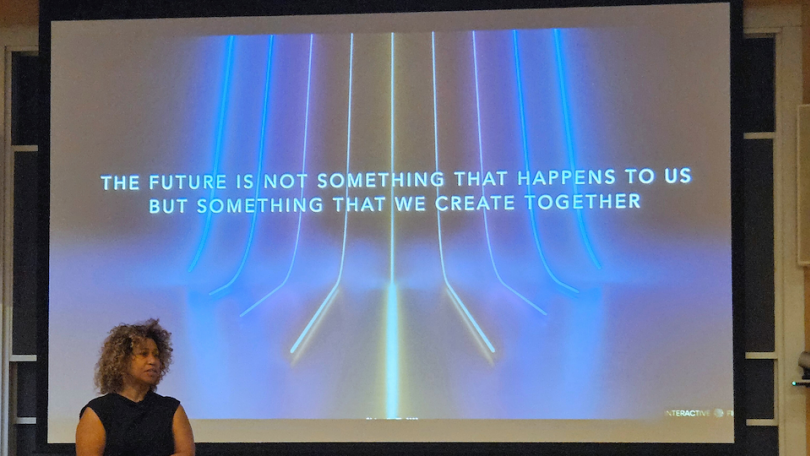This Libraries co-sponsored event invited award-winning artist and TED speaker Karen Palmer, the Storyteller from the Future to give the opening keynote. For the event organizers, Karen’s “work on AI biases and her inventive approaches to immersing audiences in understanding data ethics,” was a natural fit to launch the day.
For one of the Hackathon’s co-organizers, Jeremy Mikecz, Research Data Science Specialist at Dartmouth Libraries, the day-long event was a wonderful reminder of the value of artists in confronting a data- and AI-filled world. “[Artists] can help us recognize patterns we cannot see, perceive the world in a new way, and force us out of our comfort zones.”
Karen remained true to her reputation. She told a spellbound audience how human survival will come from the power of storytelling. Through her art and film projects, she asks and answers how storytelling experiences might reprogram the brain—to be transformative and empowering experiences that move participants from “the information age to the age of perception” because, as she said, “this info age is doing us a disservice. What we need is to expand our perception (not just take in more information).”
The success of her immersive artworks is due in part to partnering and collaborating with experts in computational science and data sets. “Art and technology are two pieces of the puzzle that come together to solve an issue,” said Karen. Fundamental to that is understanding how data sets are built and then creating them to be fit for purpose. Karen and her project partners built their own data sets and made them open-source so anyone can use the work. “It's transparent, so what you see is what you get. There are no secrets here,” she shared.
Karen’s keynote was the perfect spark to ignite the room and energize those participating in the day’s activities, which included:
- a data at Dartmouth roundtable
- a sovereign data roundtable
- the hackathon!
In essence, AI has transcended its fictional origins, emerging as a tangible force that permeates our society. Through collaborative endeavors like these, we not only explore AI's possibilities but actively shape its trajectory. "We need to make visible the conversations about data happening in pockets around campus — so we can promote open conversation and possibilities for collaboration," said Roopika. "With so many connections between the Digital Humanities and Social Engagement Cluster and the work of our colleagues in the Libraries, these collaborations are a natural fit."

